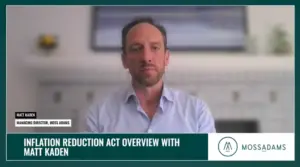Why Fairness Opinions Are Needed In SPAC Transactions
Special purpose acquisition companies (SPACs) are growing in popularity, and Bloomberg reported that between 2020 and 2021, the capital raised by SPACs more than doubled. SPACs, commonly referred to as “blank check companies,” are designed to take a company public without going through the traditional and lengthy initial public offering (IPO) process.
The first step to setting up a SPAC is forming the SPAC, collecting the capital in a blind trust with arbitrary value applied to each share. The founders have shares, but the value of a founder share is zero until and unless the transaction completes. SPACs have two years to obtain a business. Return on investments if the SPAC fails to complete the transaction in that time. Shareholders have a voice in the final transaction and vote for or against the acquisition of the business. Redemption rights protect individuals who are against the trade.
Overall, James Hanson, Managing Director with Opportune Partners LLC, an independent investment banking and financial advisory affiliate of Opportune LLP, describes the SPAC process as a “low-risk way to potentially back a sponsor.”
Hanson explains that a SPAC is an attractive means for going public over a traditional IPO because of the swiftness of the transaction. Taking a private company public via a traditional IPO can take two or three years. A de-DPAC transaction, however, can take three to four months. Hanson says that shareholders risk leaving money on the table with an IPO.
A court ruling from 1983 stated that if there is a controlling conflict, then the decision process had to be held to a higher standard. The verdict called it “entire fairness.” There had to be fairness from a price standpoint and fair dealing. This case created a broader legal standard.
Hanson emphasizes that a “fairness opinion” is a great way to protect against claims of conflict. A fairness opinion is an objective evaluation from an independent third party. It includes due diligence and exploration of the transaction in detail.
“Since 1985, fairness opinions have become the gold standard in protecting against claims of conflict of interest,” Hanson says.
Concerning the recent Delaware ruling involving the MultiPlan litigation, which Hanson discusses in more detail in his blog, titled “Should SPACs Take A Page From The MLP Playbook?”, the court was cautious about mentioning that the ruling did not hinge simply on the conflict. Rather, it was a mosaic of several factors. The proxy materials failed to disclose that one of MultiPlan’s most significant customers was considering moving the services offered by MultiPlan in-house. The loss of that customer was an implication that shareholders needed to know ahead of agreeing to the transaction.
Hanson poses the question, “Why not go through the rigorous process of getting that independent opinion to ensure that the transaction is free of conflict?”
Companies going public are looking to SPACs to get a little more certainty in the volatility of the IPO market. As SPACs continue to be the trend among directors, sponsors, and management teams for taking companies public, the SEC is considering what regulations are needed, especially when SPACs use forward-looking statements to justify de-SPAC transactions.






